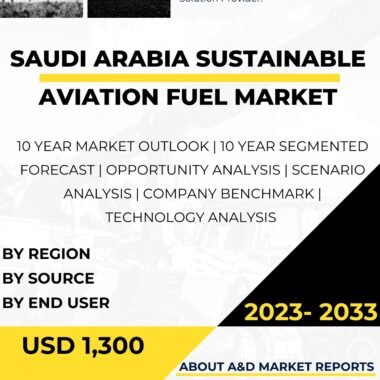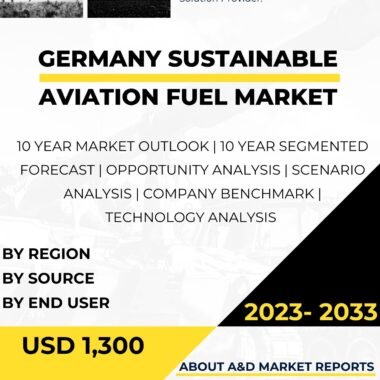Description
The sustainable aviation fuel (SAF) market in France has witnessed significant growth and development in recent years. As the aviation industry seeks to reduce its environmental impact and transition towards more sustainable practices, sustainable aviation fuel has emerged as a key solution to address the industry’s carbon emissions. France, as a nation committed to environmental sustainability and technological innovation, has been actively involved in the production, promotion, and adoption of sustainable aviation fuel, solidifying its position as a leading player in the global SAF market.
One of the primary drivers of the sustainable aviation fuel market in France is the country’s recognition of the urgent need to decarbonize the aviation sector. As one of the major contributors to greenhouse gas emissions, the aviation industry faces increasing pressure to adopt more sustainable practices and reduce its carbon footprint. Sustainable aviation fuel offers a viable alternative to traditional jet fuel, as it can be produced from renewable feedstocks such as waste materials, agricultural residues, and advanced biofuels. By investing in and promoting sustainable aviation fuel, France seeks to demonstrate its commitment to mitigating climate change and achieving carbon neutrality in the aviation sector.
The French government has been proactive in supporting the development and deployment of sustainable aviation fuel. Initiatives and policies, such as the Energy Transition for Green Growth Act and the Biojet2030 roadmap, outline the country’s roadmap to accelerate the production and adoption of sustainable aviation fuel. The government offers financial incentives, grants, and tax exemptions to support research and development in sustainable aviation fuel technology, as well as to encourage airlines to use SAF in their operations. Additionally, France actively participates in international collaborations and agreements to promote the global adoption of sustainable aviation fuel.
The aerospace industry in France plays a pivotal role in shaping the sustainable aviation fuel market. French aviation companies, research institutions, and technology providers are at the forefront of developing advanced biofuels and sustainable aviation fuel technologies. The country’s expertise in biofuel research, feedstock development, and fuel testing ensures that French-made SAF meets stringent quality and performance standards, making it a preferred choice for airlines looking to reduce their carbon emissions.
The ongoing research and development in sustainable aviation fuel technology have led to significant advancements in feedstock diversification and fuel conversion processes. France is exploring a wide range of feedstocks, including used cooking oil, algae, municipal solid waste, and lignocellulosic biomass, to produce sustainable aviation fuel. Advanced biofuel production pathways, such as hydroprocessing and Fischer-Tropsch synthesis, are being developed to convert these feedstocks into drop-in sustainable aviation fuel that can be used in existing aircraft without any modifications.
Furthermore, France actively collaborates with its international partners in joint research projects, public-private partnerships, and commercial supply agreements for sustainable aviation fuel. By sharing knowledge and resources, France can accelerate the scale-up of sustainable aviation fuel production and expand its market presence worldwide. Collaborative efforts also foster technology transfer and best practices, contributing to the global growth of the sustainable aviation fuel market.
The sustainable aviation fuel market in France extends beyond the domestic aviation industry. The country is also exploring opportunities for sustainable aviation fuel in other modes of transport, such as marine and road transportation. Sustainable aviation fuel’s potential for reducing carbon emissions is not limited to aviation alone, and France aims to leverage its expertise in this area to drive sustainability across various transportation sectors.
France’s regulatory framework and environmental standards play a pivotal role in shaping the sustainable aviation fuel market. The country’s regulations promote the use of sustainable aviation fuel and set ambitious targets for its adoption in the aviation sector. Additionally, France emphasizes the importance of sustainability certifications and traceability in sustainable aviation fuel supply chains to ensure that the fuel meets strict environmental and social criteria.
In conclusion, the sustainable aviation fuel market in France is poised for continued growth and innovation. The country’s commitment to environmental sustainability, research and development, and international collaborations positions it as a key player in the global market. The adoption of sustainable aviation fuel by French airlines and its diverse applications in other transportation sectors demonstrate France’s leadership in driving the transition towards a more sustainable and low-carbon aviation industry. As technology continues to evolve, the significance of sustainable aviation fuel in mitigating aviation emissions and advancing the goal of carbon neutrality in air travel is expected to grow, cementing France’s position as a leading innovator and supplier of sustainable aviation fuel worldwide.




